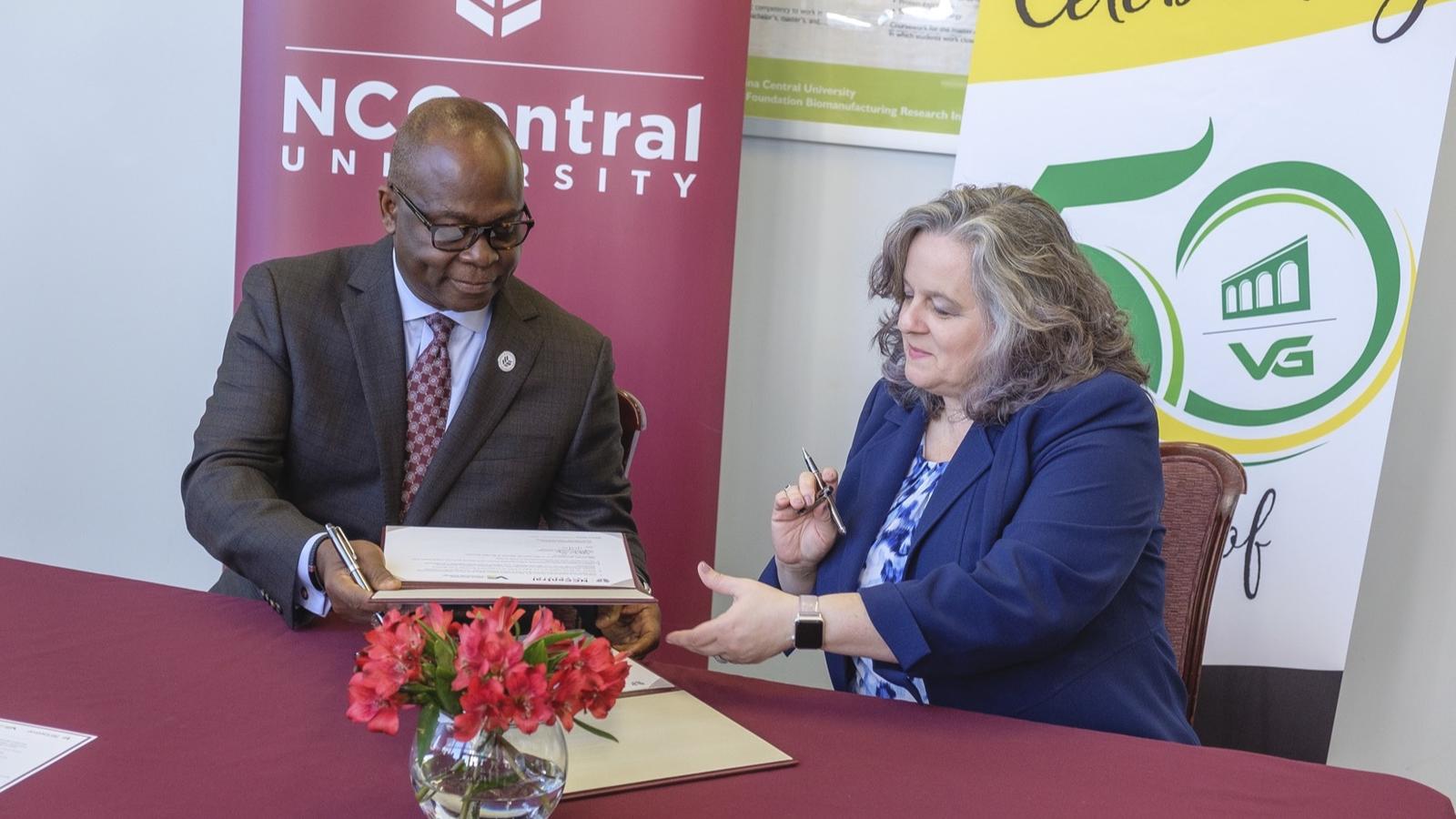North Carolina Central University (NCCU) and Vance-Granville Community College leaders signed an agreement Jan. 28, 2020, opening the doors for more students to earn the Bachelor of Science in pharmaceutical sciences.
The memorandum of understanding is part of North Carolina’s Pathways to Success program and sets up a streamlined process for graduates of Vance-Granville’s bioprocess technology Associate of Applied Sciences degree to transfer into NCCU’s baccalaureate program as juniors.
“Training scientists for the pharmaceutical industry is vitally important for the region’s economy and a strong priority at the university’s Biomanufacturing Research and Technology Enterprise (BRITE),” said NCCU Chancellor Johnson O. Akinleye.
“By partnering with Vance-Granville Community College, we have increased the pipeline of top students entering NCCU who will complete their Bachelor of Science degree in pharmaceutical sciences. We hope that many stay on, as well, to earn a master’s or a doctorate in integrated biosciences.”
As part of the two-campus agreement, Vance-Granville students can get ahead by taking NCCU coursework prior to officially entering the university. Options include a summer lab-skills workshop, externships at BRITE, and Stackable Credentials to Strengthen the Pathway to Biopharma, an online certificate program offering instruction in regulatory sciences, project management and other knowledge specific to the biopharma industry.
“We are delighted to enhance our current partnerships with NCCU by providing a new pathway for VGCC bioprocessing graduates to obtain a four-year degree in pharmaceutical science,” said Vance-Granville President Rachel Desmarais. “NCCU is a valuable partner in creating pathways to success for our students.”
The Stackable Credentials program, which has a number of components, receives funding from NIIMBL, the National Institute for Innovation in Manufacturing Biopharmaceuticals, which contributed more than $400,000 in 2018 to boost the university’s ability to train researchers, technicians and others for the life sciences field.
Biotechnology and life-sciences are among North Carolina’s fastest-growing industry segments, employing more than 75,000 workers with average annual salaries of $90,000, twice the state average. Since 2008, life-sciences employment has increased by more than 19% statewide and is expected to continue to grow as more biological products are used in drug research, development and production processes. A 2018 survey by Deloitte projects that as many as 60% of jobs in pharmaceutical manufacturing will be lacking qualified candidates to fill them by 2025.
“There are a number of career opportunities that our VGCC bioprocessing graduates will be exposed to while completing the degree in pharmaceutical science at NCCU,” said Levy Brown, vice president of Learning, Student Engagement and Success at Vance-Granville.
BRITE Director Hernan Navarro said the institute’s workforce-development approach to education is part of its mission.
“Today’s agreement gives BRITE the opportunity to expand its student base and gives Vance-Granville Community College students a way to advance their careers, so it’s great for both,” he added.
Faculty and staff working on the project include Vance-Granville’s Bioprocesses Program Director Stewart Lyon and Dean of Arts and Sciences Cecilia Wheeler, along with NCCU Pharmaceutical Science professors Kevin Williams and Andy Li, and BRITE academic recruiter Natacha Janvier-Derilus.
